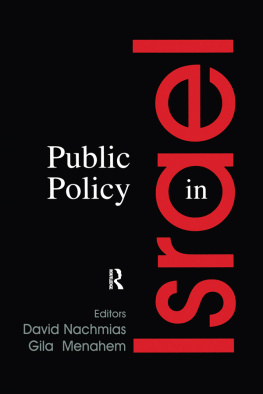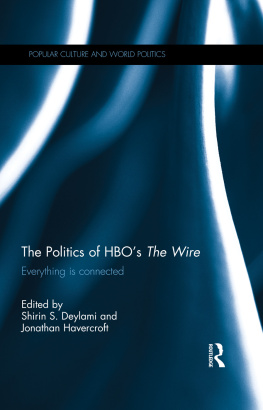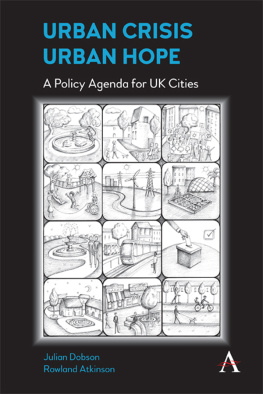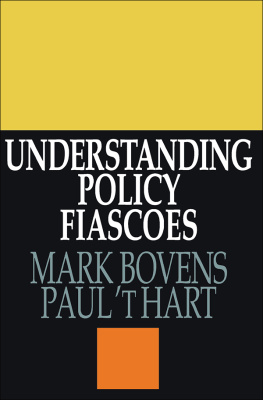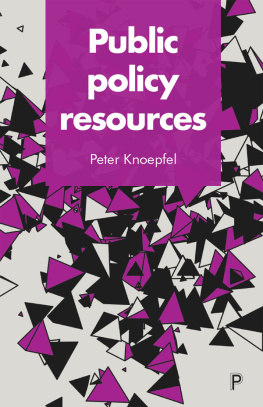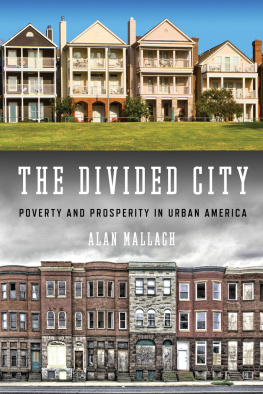TAPPING INTO THE WIRE

TAPPING INTO
THE WIRE
THE REAL URBAN CRISIS
Peter L. Beilenson, M.D., M.P.H., and Patrick A. McGuire
Featuring a Conversation with David Simon

2012 The Johns Hopkins University Press
All rights reserved. Published 2012
Printed in the United States of America on acid-free paper
Johns Hopkins Paperback edition, 2013
9 8 7 6 5 4 3 2 1
The Johns Hopkins University Press
2715 North Charles Street
Baltimore, Maryland 21218-4363
www.press.jhu.edu
The Library of Congress has cataloged the hardcover edition of this book as follows:
Beilenson, Peter L.
Tapping into The Wire : the real urban crisis / Peter L. Beilenson and Patrick A. McGuire ; featuring a conversation with David Simon.
p. ; cm.
Includes bibliographical references and index.
ISBN 978-1-4214-0750-0 (hdbk. : alk. paper)
ISBN 1-4214-0750-7 (hdbk. : alk. paper)
ISBN 978-1-4214-0761-6 (electronic)
ISBN 1-4214-0761-2 (electronic)
I. McGuire, Patrick A. (Patrick Anthony), 1946 II. Wire (Television program) III. Title.
[DNLM: 1. Beilenson, Peter L. 2. Social ProblemsBaltimoreAutobiography. 3. Urban HealthBaltimoreAutobiography. 4. Mass MediaBaltimoreAutobiography. 5. Public PolicyBaltimoreAutobiography. WA 380]
362.109227526dc23 2012008014
A catalog record for this book is available from the British Library.
ISBN-13: 978-1-4214-1190-3
ISBN-10: 1-4214-1190-3
Frontispiece: Graffiti Alley, North Avenue at Howard Street, Baltimore, 2011. Photo: J. M. Fragomeni
Special discounts are available for bulk purchases of this book. For more information, please contact Special Sales at 410-516-6936 or specialsales@press.jhu.edu.
The Johns Hopkins University Press uses environmentally friendly book materials, including recycled text paper that is composed of at least 30 percent post-consumer waste, whenever possible.
For my wife, Chris
and my children, Valerie, Alex, Jane, Jack, and Hank
for their constant support
and
my parents, Tony and Dolores
for their embodiment of principled public service
PB
For Kath
PM
CONTENTS
FOREWORD
A CONVERSATION WITH DAVID SIMON, CREATOR OF THE WIRE
by Patrick A. McGuire
AMONG THE THOUSANDS INSPIRED to enter journalism by the 1972 Watergate reporting of Bob Woodward and Carl Bernstein was a young, Bethesda, Maryland, teenager named David Simon. A writer for his high school paper and, later, editor of the Diamondback at the University of Maryland, Simon pursued his dream of becoming a reporter steadily and efficiently. He joined the staff of the Baltimore Sun only ten years later, in 1982. For most of the next thirteen years, he covered the papers police beat.
The cop shop is not a glamorous reporting assignment. It is safe to say that most reporters who have covered the police department were not sad to leave it behind for something less chaotic and more predictable. The hours are awful, weekend shifts and night shifts are plentiful, and the information surrounding most crime stories is maddeningly difficult to pry loose from suspicious or personality challenged cops.
Simon, however, thrived at it, turning in solid copy marked by numerous inside sources and a gritty, readable style. He earned the trust of enough local cops that the department allowed him to spend a year practically living with the homicide squad while researching a book. When it was published, Homicide: A Year on the Killing Streets was grabbed up by Baltimore native Barry Levinson, who turned it into an award-winning TV series with Simon writing many of the scripts.
During his newspaper days, it was clear to the reporters who worked with himmyself includedthat Simon was a different breed of journalist. Besides being a tenacious reporter who knew how to get information, he was a writer of evocative prose. Sometimes forgotten is the notion that a journalist is one who strives to master two arts: reporting and writing. Often, those who approach such mastery are known by their passionnot merely for the job, for the career, or even for the paper. Rather, its a passion for telling a story well. David seemed always ablaze with the righteousness of whatever story he was working on. He would defend his ideas long and hard against editors who thought they could impose their own vision of the story on him.
In my view, the Baltimore Sun was never a writers paper. It was not the paper of H. L. Menckenthat was the Evening Sun, the afternoon paper that eventually died or was killed off, depending on how close you were to the body on the sidewalk. The morning paper, simply The Sun, proudly waved the banner of hard, serious news; it stood proud, sometimes to the point of overbearance, behind its laudable record in covering wars and international intrigue. It never quite figured out what it had in Simon or how to deal with his ever-broadening streak of independence. That he would one day leave seemed inevitable to many and became fact in 1995.
That year, Simon teamed up with former Baltimore homicide detective Ed Burns to write The Corner. Its a true-life look at an impoverished family living near the corner of Fayette Street and North Monroethe heart of the west Baltimore drug world where dealers often sell their goods from street corners. Simon adapted the book into a six part mini-series for HBO. He wrote five of the six scripts and earned a credit as a producer. The series won three Emmy awards.
Simon then conceived the idea for a new HBO series called The Wire and was given the go-ahead to film a pilot. Again, he teamed up with writing partner Ed Burns. The series, which ran for five seasons, premiered on HBO in 2002. It introduced the world not only to Baltimoreits cops, politicians, drug addicts, union leaders, crime lords, and newspaper editorsbut also to the state of crime, poverty, official indifference, and general urban decay found in most American cities. Its characters were fictional but drawn from the street reality Simon and Burns had observed and interacted with for years as newsman and detective.
Following that success Simon produced and wrote Generation Kill, a six-part HBO series based on a book of the same title by Evan Wright. It told the story of the First Reconnaissance Marine battalion during the 2003 Iraq invasion. His latest work for HBO, a series called Treme, focuses on a group of New Orleans musicians whose lives were dramatically affected by Hurricane Katrina.
In 2009, after Peter Beilenson asked me to join him in writing this book, I suggested that it include the voice of David Simon. In the fall of 2010, I interviewed David at his home in Baltimores Locust Point. What follows are the highlights of that talk as they relate to the subject of this book: public health imperatives that are at the heart of every episode of the program David Simon called The Wire.
Patrick A. McGuire
Patrick McGuire: A relatively new model of public health is taking hold in many areas of the country. It goes beyond the traditional role of dealing with issues such as immunizations and safe-water initiatives. It views the spillover effects of drug-related chaos in our inner cities as a threat to the health and well-being of all citizensnot just those in certain neighborhoods.
Next page


